Turkish stuffed aubergines so delicious the imam who first ate them, fainted out of pure delight. Or was it in shock? Nevermind, the only thing that matters is this: Imam bayildi is perhaps the most delicious thing you can make with the mighty aubergine.
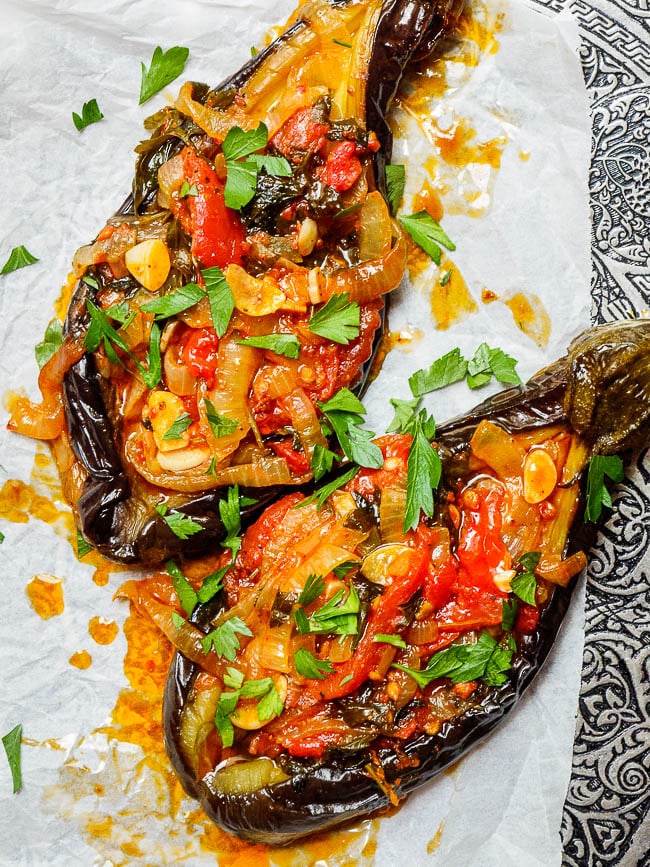
This is nothing less than one of the most famous dishes of Turkish cuisines. İmam bayıldı, literally “the imam fainted”*, likely hails from the Aegean coast. It is known across much of the former empirical lands of the Ottomans, notably also in Greece.
To the amusement of some Turks, many Greeks claim heritage to the dish. Christians of Greek heritage were a significant minority during the Ottoman empire, and there is indeed much overlap between Greek and Western Turkish cuisine. The name of the dish does bring the claim somewhat explicitly into question, however.
İmam bayıldı is part of a family of dishes of vegetables braised in copious amounts of olive oil, known in Turkey as zeytinyağlı.
What is it about this dish that knocks imams to the floor?
There are several versions of the story.
A well-known version suggests the imam fainted in delight over the delicious meal his wife had cooked for him.
Another suggests it wasn’t the taste that cause the imam to lose his consciousness, but the thought of the cost of the olive oil that had gone into making the dish.
My favourite tells the story of an imam who married the daughter of an olive oil merchant. 12 bottles of the most exquisite olive oil was gifted as part of the dowry.
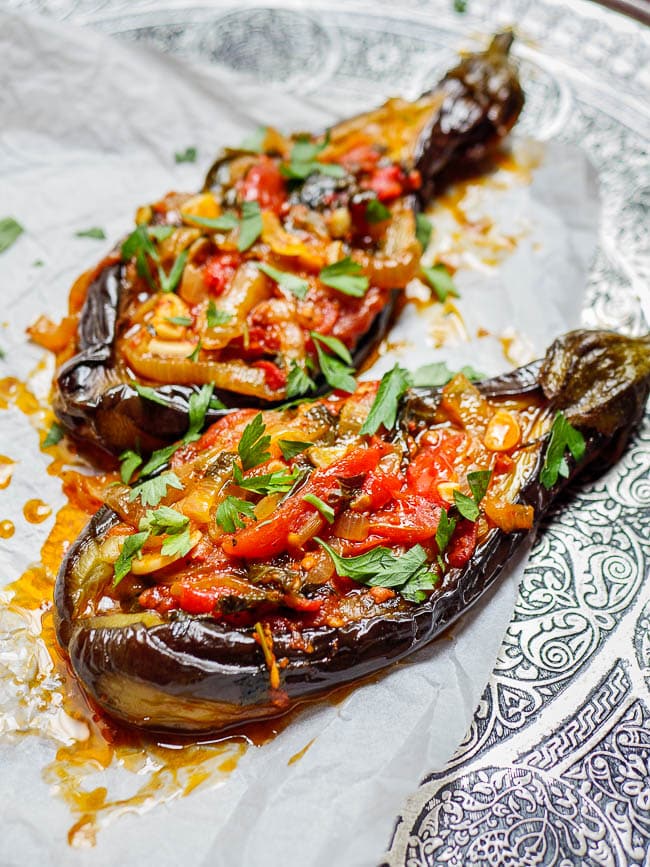
On the first night, the imam asked his wife to make something delicious using some of the olive oil her father had gifted them. She went on to make a delicious dish of aubergines stuffed with onions and tomatoes. The imam loved the dish so much, he demanded it be part of dinner every single day.
And so it was. Until the thirteenth day, when suddenly no aubergines were served.
— Where are the stuffed aubergines?, the imam demanded.
His wife could only admit that she was no longer able to make it. The 12 bottles of beautiful olive oil were all empty. Nothing was left.
Upon hearing the exlusive dowry had already been spent, the imam was so shocked he fainted on the spot.
How to make Turkish stuffed aubergines
If you google imam bayıldı, the internet offers a huge number of recipes. Not all of them are equally authentic.
There are a few things that separates imam bayildi from most other stuffed aubergine dishes.
For starters, the generous amounts of olive oil used (and it should be extra virgin).
Second, the relative amounts of onions to tomato. While many modern recipes stuff the aubergines with a tomato sauce, onion is the main stuffing ingredient in traditional recipes.
Finally, the absence of any spices. As with most dishes in Western Turkish cuisine, spices more commonly used in the Middle East or Greece are not used.
It is best to use long, thin aubergines. If you can small ones, even better. That said, different types of aubergines don’t have wildly different flavour, so if a big one is all you’ve got, that’ll do too. In which case it may be worth halving the aubergine rather than stuffing it like a baguette, as the recipe below suggests.
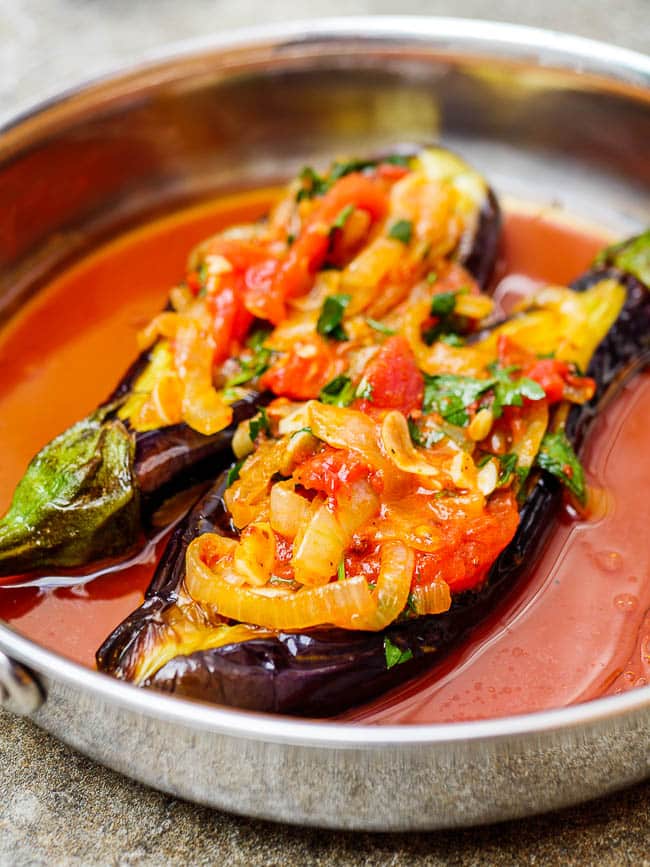
Making imam bayıldı takes a while. The low, slow braise in plenty of olive oil is part of what makes the dish so special. Aubergines love olive oil, soaking it up and turning into the most wonderfully luscious and filling aubergine flesh once cooked.
For a simpler version, you can roast the aubergines. This also makes for a delicious imam bayildi, but if you’ve tried the low, slow braise, you’ll soon realise there’s no beating the good old methods. But don’t skimp on the olive oil!
If you like aubergines, I promise you it’s time well spent. It may look simple, but once you take a bite, it’s easy to understand why the imam may have fainted in delight.
How to serve imam bayildi
İmam bayıldı is eaten at room temperature. It can be served as one of several dishes for a meze style meal, as a vegetarian/vegan main course, or even alongside meat or fish, if you like. Plain rice or bulgur works wonderfully alongside.
I wouldn’t serve it with anything too spiced or spicy. You don’t want anything to overpower such a delicate and beautiful dish!
Serves 2-6, depending what else you offer up alongside.
Try these (naturally vegan) Turkish classics as well:
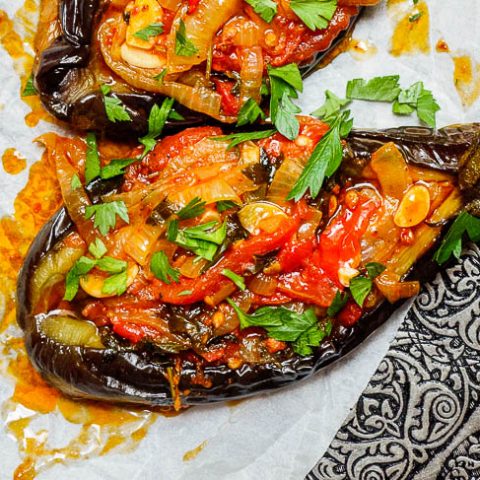
Imam bayildi – Turkish stuffed aubergines
Ingredients
- 6 small aubergine (eggplant), or 2 regular sized (preferably of the long and slender variety, if you can find them)
- 135 ml olive oil, divided (I use a mild extra virgin)
- 25 g tomato paste
- 300 ml boiling water
- 1/2 tsp sugar
- flat-leaf parsley, chopped, to garnish
- salt and pepper
Stuffing
- 2 Tbsp olive oil, I use a mild extra virgin
- 2 medium onion, cut into thin half moons
- 4 garlic cloves, finely sliced
- 250 g tomato, (2 medium), peeled and cut into wedges
- 10 g flat-leaf parsley, chopped
- 1 tsp pul biber (Aleppo pepper), or other chili flakes to taste (optional)
- salt and pepper
How I make it
- Peel half the skin off the aubergines, so they resemble a zebra pattern. Salt generously and set aside for half an hour.
- Meanwhile, make the stuffing. Heat a thick bottomed frying pan over medium heat. Add 2 Tbsp olive oil and fry the onion until softened, but not browned, 8-10 minutes. Stir regularly. Add the garlic and fry for another minute, stirring constantly, taking care not to burn the garlic. Add the tomatoes and Aleppo pepper (if using). Keep frying until the tomatoes collapse and the liquid starts to thicken, 5-6 minutes. Stir every once in a while to ensure nothing catches at the bottom. Add the flat-leaf parsley and some salt and pepper. Take off the heat.
- Brush the salt off the aubergines. Heat a thick bottomed frying pan over medium heat. Add 2 Tbsp olive oil and fry the aubergines until they start to soften, turning regularly. Alternatively, roast in a preheated oven at
200 °C until starting to soften, around 20 minutes.
- Make a lengthwise incision in the aubergines, as if opening a baguette, leaving 2 cm (⅘ in) at either end. The incision should not pierce through the bottom of the aubergines.
- Add the stuffing into the aubergines and place them, stuffed side up, in a pan for which you have a lid. Add the remaining olive oil (5 Tbsp/75 ml/⅓ cup) to the pan. Mix the tomato paste, sugar and boiling water with a little salt and pepper. Add enough of the liquid to the pan to go about halfway up the side of the aubergines.
- Bring to a boil, put on a lid and turn the heat down to low. Leave to simmer until the aubergines are completely soft, around 45 minutes. Add extra liquid if it’s starting to look a little dry. Set aside to cool completely. Scatter a little flat-leaf parsley over before serving.
*In fact, while “bayıldı” literally means fainted in Turkish, it’s also a commonly used expression for something extraordinarily delightful. Though perhaps that use of the word itself comes from the story of the imam that fainted? Who knows…



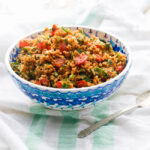


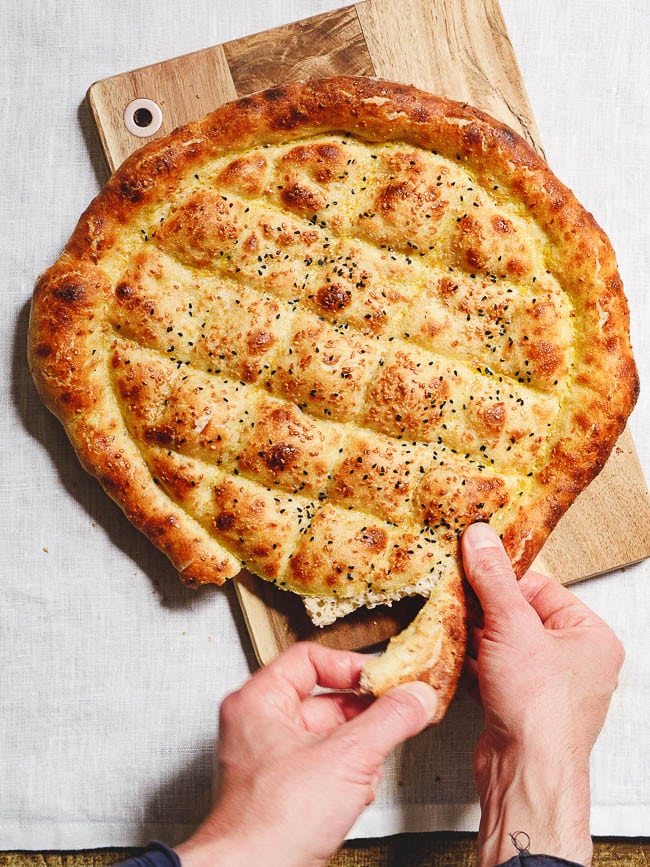
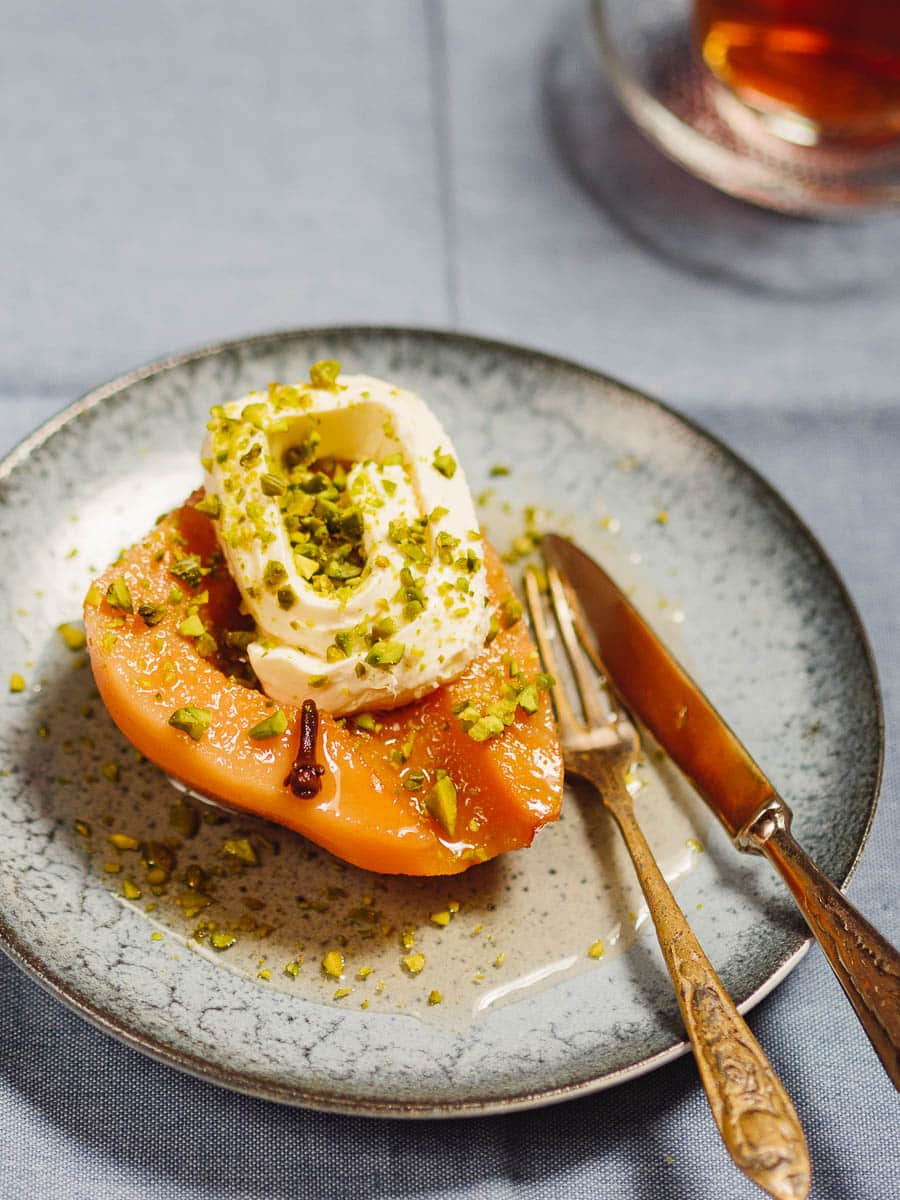
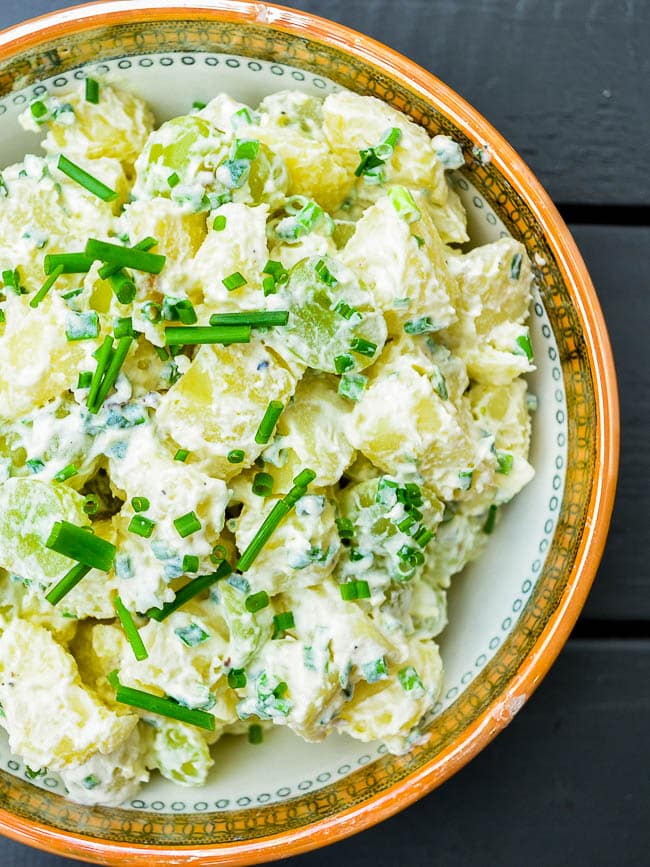
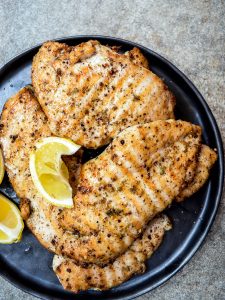






25 responses
Love your work Vidar.
This may leave you crying into your kavhe but the only tomato sauce or paste I had was some left over marinara sauce I’d made earlier in the week. But I must say despite it’s new found accident born of necessity Turkish-Italian fusion, it came out absolutely bloody lovely.
Thank you for your recipe and apologies for derailing it a little
Thank you Vidar. Authentic and super delicious recipes! I am a vegan and lived in Turkey for many years before moving to Bulgaria. I lost my original recipe for Imam Bayildi so was delighted to find yours here-what joy! Exactly how I remembered it. I went on to make the mercimek koftesi too and I wasn’t disappointed-going to try lots more from your kitchen now 🙂 I have lots of lovely photos…
That’s amazing to hear! Happy hunting through the archives 🙂
I love aubergine! Can’t wait to try it for my Turkey themed dinner 😊😍 can I cook it the day before, store in a refrigerator and then serve them at normal temperature the day after? Thanks for your delicious recipes!
They’ll always be best the same day, but I regularly eat them next day, so it should be fine! Just make sure to leave them out for long enough to come back to room temperature, or slightly reheat them.
Yours is my go to recipe for imam bayildi, it is easy to follow and yields a very delicious dish, which instantly became my otherwise very picky daughter’s favorite. I made it at least 6 times already. Thank you!
How wonderful to hear! Thank you for sharing with me.
I made this last night with aubergines fresh from my garden and fresh Roma tomatoes from my local tomato farm. I served it with your Lebanese hummus and lemony lamb recipe and a fresh garden salad. It was an ABSOLUTELY amazing meal. I’ll certainly do this recipe again when aubergines are prolific in my garden (it’s winter here in Australia at the moment but my trusty aubergine plant is still yielding occasional fruit).
Oh, to have your own aubergines! That’s wonderful to hear, thanks so much for sharing!
I love your recipe for imam bayldi! Just like my mother in law used to make (she is no longer around, so this brings a lot of nice memories). Many thanks for sharing this one. Your recipes are my go to for authentic Turkish foods.
In the 1960’s my wife, Libby, at the Yale Folkdance group, organized special dinners. She took on a Turkish dinner once. We read the recipes and made various dishes. But we could not convince ourselves that the Imam Bayildi should really be eaten cold. We convinced ourselves that it must be a mistake, and served it hot. It was good anyway, but after spending many years living in Turkey, and eating much Imam Bayildi, I now know better.
A very common “mistake” for Westerners attempting Turkish food for the first time! Another classic is frying mercimek köfte, not believing it should be served cold and as is 🙂
Just made this recipe for a meze night, with a couple of other classics. It was nice, I’ve had better, BUT the only eggplants I could find were far too big (like, very huge) and it messed with cooking time, stuffing and the amount of liquid. IMO you can’t find smaller eggplants make a saksuka or something else – but if you can find the right ones this recipe is spot-on – the onions and garlic smell sooo lovely while cooking.
Thanks for your comment! I agree that very large aubergines are less suited here. It also changes the proportions of aubergine/filling. An option would in that case would be to slice them in half rather than keep them whole, and to double the amount of filling (or halve the number of aubergines). Glad you enjoyed it anyway!
I had used this recipe Years ago and loved it!
When my husband passed I stopped cooking as I had before. My friends and started talking about different recipes.
So I had 3 Zucchini and scooped out the meat ,, chopped it up. Then we zGoof Olive Oil I baked the Zucchine wt Olive oil. Then when slightly soft… Sautéed many onions n garlic and blended it with all , added some cooked Farro seeds and Cuscus ,, blended stuffing the Zucchini and sautéed , added fire baked tomatoes and some cherry tomatoes ( which I couldn’t use, placing them in cold water placed in fridge almost 2 weeks. They were firm and delicious ..
Returned it all to oven and baked it a short time to heat it…. I’m 93 and this was a nice incentive to cook for my friends👏
So sorry for your loss, but what a wonderful story. Thank you so much for sharing.
I’m going to cook this fir my daughter this evening. Aubergine her absolute favourite vegetable
Have made this many times, but have never baked the aubergine beforehand. I simply stuff it and bake it. I see no need for the extra baking step.
The purpose of the first stage of cooking the aubergines is to soften them, allowing you to stuff the aubergines more easily and more generously. It also helps shorten the total cooking time, as you can do this at the same time as making the filling.
This recipe still has another 20 minutes to go and I’m already completely thrilled. Thank you.
Hi Vidar, Thank you for sharing the recipe.
The first time I ate the Imam fainted I almost fainted. It’s one of the best foods I’ve ever eaten. Can’t wait to try your recipe.
Oh Vidar, this was bloody fantastic…….I made it with 3 whole aubergines. I am so happy with the result! My work ladies also loved it but I have the 3rd one left just for ME…………….can’t wait to eat it. I too could faint from happiness eating it hehhahahahah – Thank you so much!!!!!
Hello,
I saw your recipe and I decided to make it. The imam biyaldi aubergine is delicious, just wonderful, cooked in his own flavours. My husband could get enough.
I also made the shepherd salad. Lovely too.
So thank you very much.
FABULOUS our Greek mothers also cooked imam bayldi in far away South Africa. Learnt from yiayas and turkish friends in the villages of Cyprus